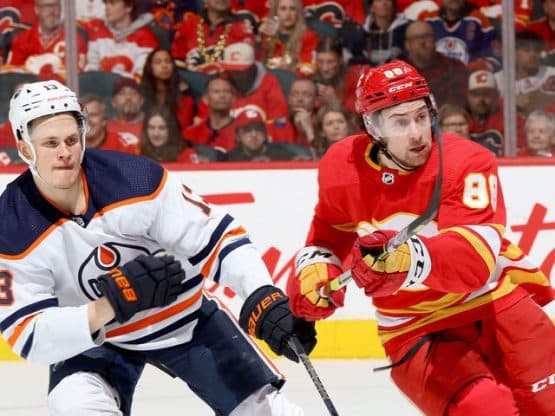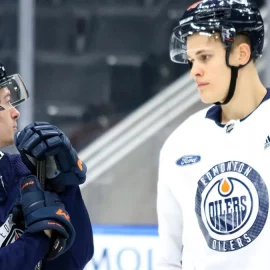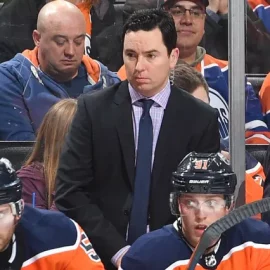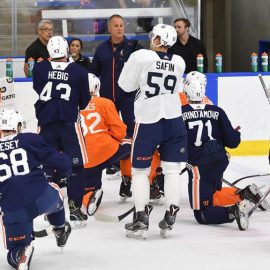Professional sports, entertaining as they can be, are not just sports. Fans don’t often see the business side of things, and that can often cloud their judgement when it comes to transactions and player signings. Case in point? This Oilers off-season.
The last two weeks especially have been tumultuous, to say the least.
In case you missed it, Taylor Hall was traded for Adam Larsson, Milan Lucic was signed to a deal that’s at least 2 years too long, and Oilers Twitter is split right down the middle. On the one side, there are people who are upset (whether that be mad, sad, disgusted) about the trade; on the other are people who are over it and just want the team to win (or who hated Taylor Hall and have wanted him gone forever). The split isn’t new by any stretch, but the chasm between the camps is wider and deeper than ever.
Here’s the thing about The Trade: Adam Larsson isn’t a bad hockey player. It’s not like Peter Chiarelli traded Hall for Nikita Nikitin or someone like him; Larsson can play, and maybe everything will work out alright in the end. But at this juncture, that doesn’t matter. Larsson’s contribution to the Oilers is purely hypothetical right now, because it’s still July; there’s absolutely no way to know if he’ll ever be the kind of player that management thinks can be. This is the sticking point for a lot of people because Hall’s skills and abilities are known to Oiler fans while Larsson’s, by and large, are not. That’s not to say that fans can’t learn about Larsson, but it’s still all hypothetical because everything about him is based on what he did in New Jersey.
With the loss of Taylor Hall and the addition of Larsson and free agent LW Milan Lucic (plus whatever other pieces are moved in the next couple months), the Oilers lineup will look much different in the fall. Lucic isn’t Taylor Hall, and he shouldn’t be mistaken as a replacement. Other, better, minds have written about that, so you won’t see any of those comparisons here. The jury’s still out on whether or not the Oilers will be better next season (though if they are, it’ll have less to do with Larsson and Lucic and more to do with healthy McDavid/Klefbom/Eberle).
The Business of Sports
The thing about pro sports is that there needs to be buy-in from fans in order for the industry to thrive. It’s not like a toilet paper company, where their product is ultimately a necessity and will be purchased anyway. Instead it’s a product that needs to change and evolve in order to keep the attention of the consumer. So when teams trade players or work at recruiting free agents, this is done with the hope that the payoff will come in the form of wins (both regular season and playoff). The Edmonton Oilers have not lived up to their end of that bargain. They haven’t made the playoffs in 10 years, and are now down an elite LW.
What’s lost in all of the handwringing about The Trade is that professional sport is an industry, and its business is making money. There needs to be support from a fan base, or else franchises don’t make any money. If a team is good, that buy-in is easy – long-time fans feel like their loyalty is paying off, and new fans feel welcomed by the spirit of the people around them. This happens whenever a team goes on a run to a championship; the bandwagon fills up and everyone loves it. This is good for a franchise’s bottom line – more fans means more bums in the seats and more money spent on the team.
When a team is bad, however, for fans to want to continue supporting a team, there needs to be some kind of reciprocal relationship between the team and the fans. The contract that fans agree to is fairly simple: support us and we will reward you with a championship. Obviously, that’s not true in a large number of cases (as Oiler fans well know), and the fans can start to question their loyalty to their teams.
Why It Matters
Oiler fans are passionate about their team, and become attached to players (whether they intended to or not), and are more than willing to accept personnel changes as long as the team gets better. The results of the trade won’t be immediately and there is a cadre of fans who will need to see some marked improvement (like a deep playoff run) before they believe that this was the best possible solution.
Not all fans reacted to the trade the same way, which led to a very pronounced chasm between the camps, but my reaction can be summed up in the following tweets:
Don’t @ me. I don’t care.
— Megan (@mig14) June 29, 2016
//platform.twitter.com/widgets.js
I absolutely cannot believe that we traded @hallsy04. Like I just can’t.
Don’t rationalize this for me, just let me be sad.— Megan (@mig14) June 29, 2016
//platform.twitter.com/widgets.js
Sports are dumb.
Time is a flat circle.
We’re all going to die anyway.Let me know when y’all are done fighting.
— Megan (@mig14) July 3, 2016
//platform.twitter.com/widgets.js
Last night, I finally admitted out loud that Hall wasn’t coming back, and I was NOT prepared for the feelings I had about that.
— Megan (@mig14) July 5, 2016
//platform.twitter.com/widgets.jsIn order to get to that place, I started thinking about the industry itself and why we get so attached to players and teams. The Oilers are a small-market franchise and for anyone who’s been a fan since at least the 90s, there was a real danger of them leaving town until the EIG stepped in to keep them here. We embrace the players because they’re part of our community; we see them out having dinner with their families and going to movies, just like we do. For all intents and purposes Edmonton is a small town, and seeing these stars around the city reminds us that they’re ours. When someone requests a trade or signs elsewhere at the end of a contract, it hurts us not because they went somewhere else but because they didn’t want to be here.
There’s a reason that some of the most beloved Oilers (even on the current roster) are described as being hardworking, or gritty, or scrappy. It’s an ethos that fans continue to subscribe to even though it’s been years since there has been a team that fits that bill. But the hardworking, blue-collar players become fan favourites because they fit into the molds we have cast for them. Skilled players become favourites for different reasons, and it’s still hard to watch them go.
It’s not unreasonable to expect that fans will have visceral reactions to seeing their favourite players leave their team. As much as it’s “just a game”, fans invest time and money into the team and expect some kind of payoff; when that doesn’t come in the form of a championship, it manifests itself in other ways. In the case of the rebuild-era Oilers, the payoff for having the high draft picks was supposed to be a better team. Led by Taylor Hall, Jordan Eberle and Ryan Nugent-Hopkins, this team was supposed to be competitive, and in the playoffs, and maybe coming close to winning another Stanley Cup.
Instead, the team we’ve stood behind for years is slowly being dismantled and we have to remember that we love the team first, and the players second. The Edmonton Oilers are a business, and the goal of business is to make money. If changing things up allows for success both on and off the ice, then we have to accept that the changes might not be to our satisfaction.
When Connor McDavid does hoist the Stanley Cup as an Edmonton Oiler, all of this will be forgotten. Besides, it could always be worse.
We could be Leafs fans.
Add The Sports Daily to your Google News Feed!






